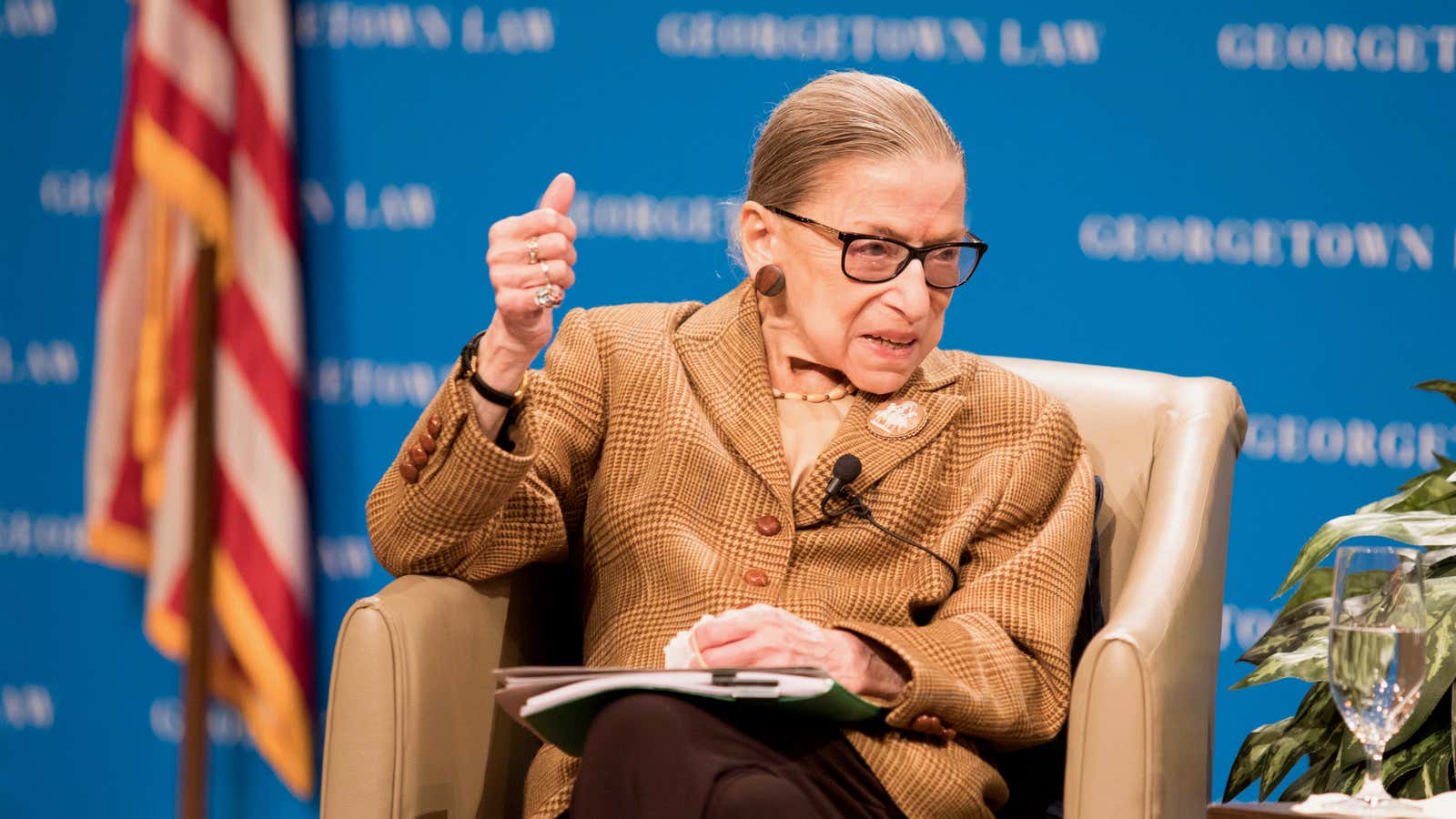US Supreme Court justice Ruth Bader Ginsburg is a giant of jurisprudence with impeccable feminist credentials. Yet she upset some legal commentators this week with a statement about the Equal Rights Amendment, a proposed constitutional clause that was the subject of a vote in the House of Representatives today.
Ginsburg champions the ERA, which states that “equality of rights under the law shall not be denied or abridged by the United States or by any state on account of sex.” The high court justice believes the amendment is an important addition to the Constitution, she told Georgetown University Law Center students at an event on Feb. 10 about the century of struggle to ratify the ERA.
She noted that every country to ratify a constitution since 1954 has included a women’s equality clause while American states still haven’t fully embraced the ERA. Ginsburg also rejected claims that existence of the 14th Amendment—the Equal Protection Clause—renders the ERA redundant. The 14th Amendment isn’t sufficient, she explained, because it makes no mention of women’s equal legal status specifically.
As such, Ginsburg would likely be pleased that the House’s Democratic majority, along with five Republican lawmakers, approved removal of the 1972 deadline on ratification imposed in the last century. Theoretically, this would eliminate obstacles to the amendment’s inclusion in the Constitution. However, probable future roadblocks do worry Ginsburg, and with good reason.
A vote on the resolution to remove the deadline in the Republican-majority Senate may not go the same way, for one thing, based on majority leader Mitch McConnell’s tight hold on his flock and recent comments that he is personally not a supporter.
But Ginsburg didn’t talk politics with law students. She simply explained that it may be wiser to “start over.” That comment—by one of the amendment’s greatest champions—angered some ERA advocates.
“I’d like to see a new beginning,” she said, explaining that some states have withdrawn their previous approvals. Adopting the old amendment today—given the deadline imposed—leaves it vulnerable, she believes. The legal reasoning for this seemingly scandalous proposal is that without a new start, the ERA’s legitimacy could be easily challenged in view of its long and complex history.
So far, 38 states have approved the amendment, three of them in recent years, the latest being Virginia. Some advocates for the amendment concede that there is controversy, as Ginsburg said, although they don’t necessarily view it as fatal—that is, if Congress ended up approving the joint resolution that passed the House today.
Linda Coberly, chair of the national ERA Coalition’s Legal Task Force this week wrote in an American Constitution Society post that “much has been made of … Ginsburg’s recent comments.” Still, as Coberly notes, Ginsburg didn’t address the pending legislation or cases brought by three state attorneys general challenging the time limits because she cannot. Judges aren’t supposed to opine on such matters. “Ginsburg did not cross this important line,” Coberly writes.
Still, “On the merits of the Equal Rights Amendment, Justice Ginsburg’s views are clear.”
That is certainly true. Ginsburg wasn’t dealing a “fatal blow” to the ERA, as some claimed. She wants to ensure its strength, and was speaking to future attorneys about the technical problems plaguing a constitutional amendment that she has always believed was critically important to American women, practically and symbolically. Lamenting the fact that the ERA is still struggling, Ginsburg said, “I’d like to show my granddaughters the equal citizenship status of women.”
